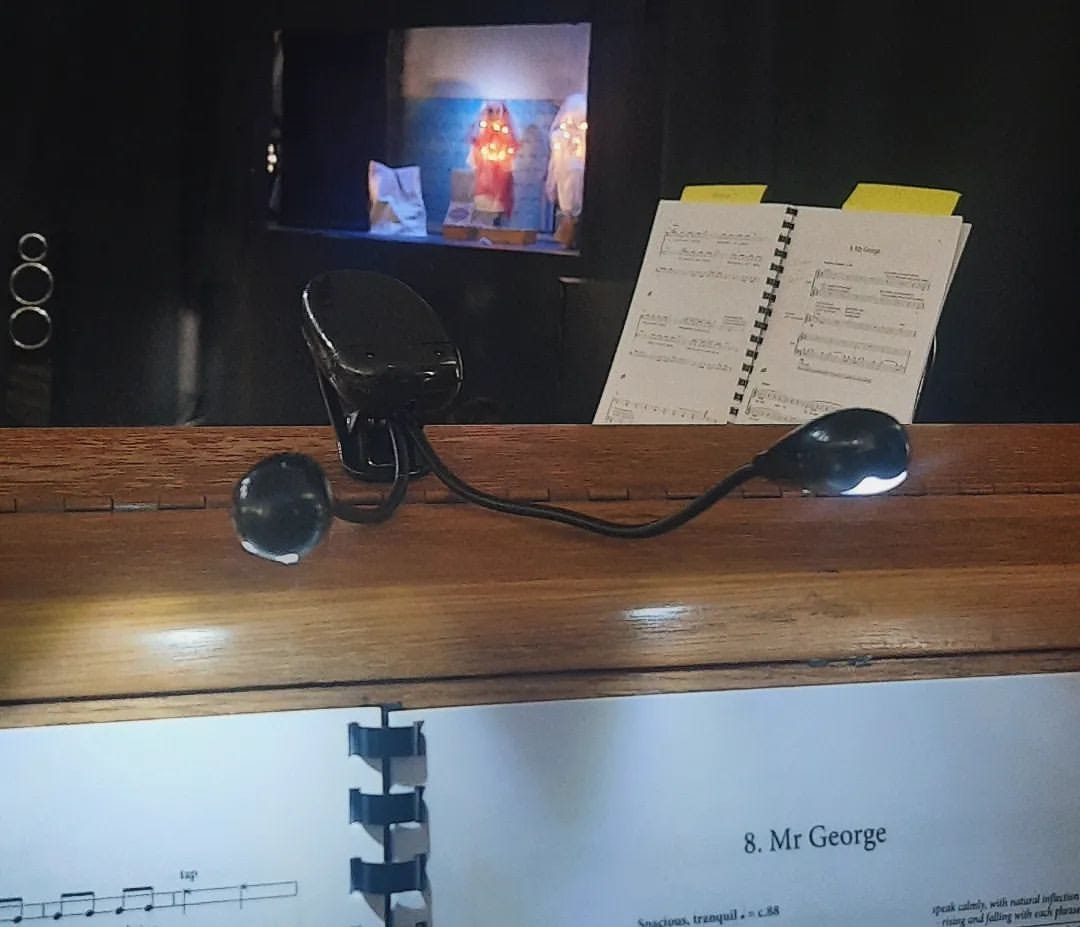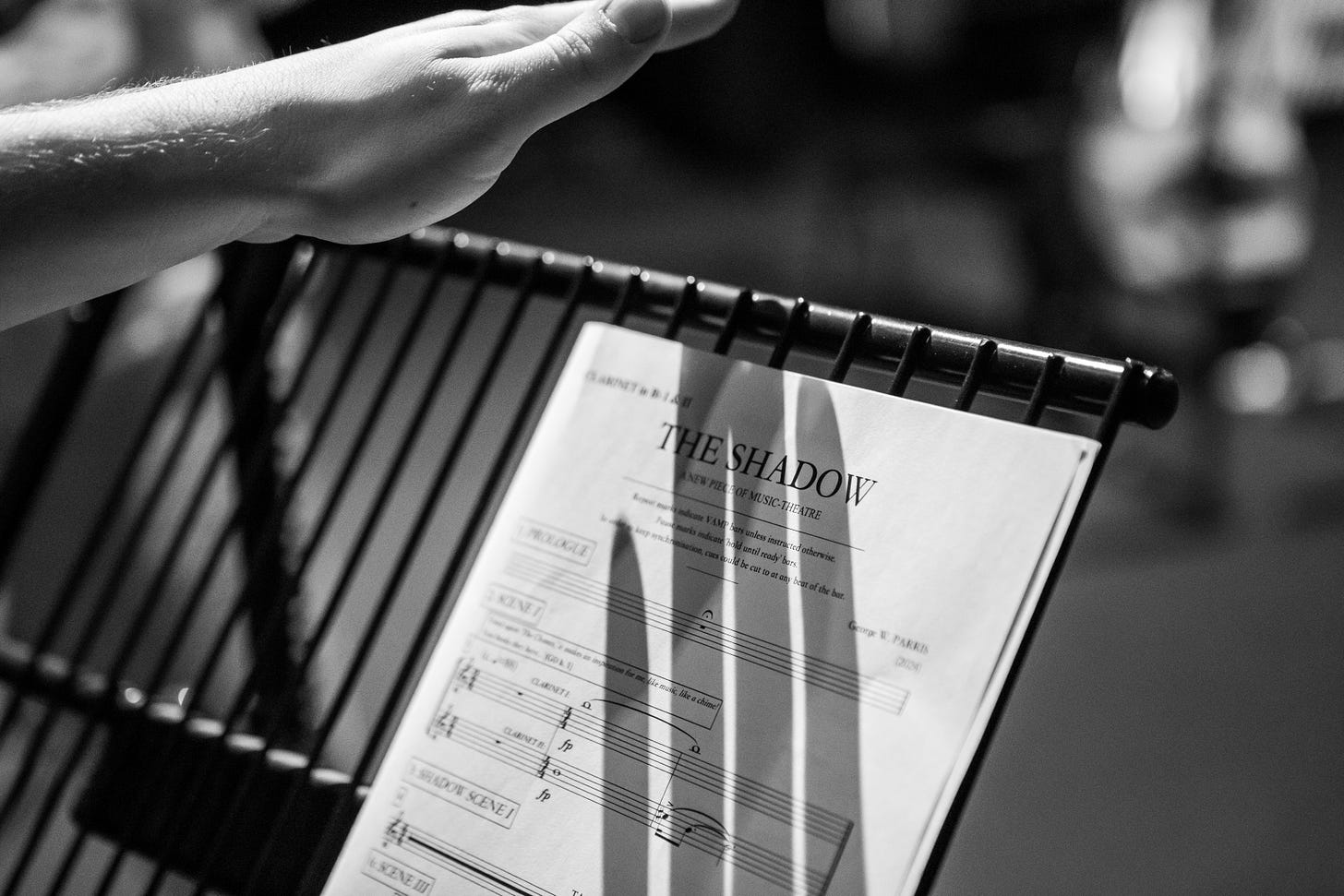I thought it might be fun today to share some of my experiences working with songwriters and composers, and to give what little advice I can about how you could add musical credits to your cv. I’m by no means an expert, but here’s what I’ve learned so far.
What does it mean to write for music?
From my experience, there are three main ways in which writers end up working with a composer:
1. You write without thinking about music and then music is added later on. This happened when my play In A Cave, A Voice, was chosen for the National Student Drama Festival, but because of Covid had to be adapted into an audio play. The wonderful Lily Blundell stepped in and composed some primal, rhythmic music to accompany the story which was set in a Neolithic cave. The play did go on to tour as a live performance once The Plague had passed, but we kept the music and integrated it into the live show. You can hear a glimpse of it in the trailer below.
2. You write a play knowing that music will be a part of the storytelling. In 2023, I collaborated with composer George Parris on a short play called The Shadow which revolved around a neglected Hans Christian Andersen fairy tale interwoven with the true story of his embarrassing visit to Charles Dickens’ home. I was writing for actors and George was writing for instruments, but we worked together from the start. The conductor and the musicians represented inspiration and were present on stage throughout the piece. Characters interacted with them and grew closer and more distant at different moments in the plot (as Andersen lost his love of writing and regained it). You can get a glimpse of what that was like from this rehearsal video. Crucially here, the actors aren’t singers and are speaking their lines alongside the music.
3. You write lyrics for a piece of music to be sung. This is a different kettle of fish entirely and is the type of writing that requires far closer collaboration with the composer and a lot more musicality in your words (e.g. rhyme, rhythm, onomatopoeia). Louise Drewett and I recently collaborated on a set of songs to accompany a marionette play for the Young People’s Puppet Theatre. The music had to be simple and catchy enough that it could be learned and performed by children, but also had to advance the plot. The songs needed to be long enough to cover the scene change going on behind the curtain, and short enough not to test the audience’s patience. My main takeaway here when writing lyrics is that you’ll end up needing about 30% of the words you think you need. Music has a ballooning effect; it rolls out consonants and expands vowels to extraordinary proportions. Words need to earn their keep both in terms of sound and meaning. This is a skill I’m still learning.
Why Write for Music?
I’ve already done a numbered list, so I’ll do an alphabetised one this time:
a) It’s another string to your bow (so to speak). If you love writing, writing for music can be a brand new challenge that hones your abilities, so that’s worth doing for its own merits. It makes you more versatile as a writer and trains your ear for the way your words communicate in a new context.
b) It’s less lonely. Just like playwriting, writing with a composer and musicians brings the opportunity to be part of a bigger creative team. I’ve never been a huge fan of working collaboratively on the writing itself, but I love working alongside people with a range of skills I don’t possess. Actors, directors, producers etc shape a script as they bring it to life, and composers and musicians bring something completely different to the table which likewise enriches your work. You still get to squirrel away with the words on your own, but the burden isn’t entirely on you to make the end result a success.
c) There’s money in it. Sort of. I’ve worked on several paid commissions which have involved music, usually providing lyrics for a composer to turn into a song. You’d be surprised how many organisations and events commission bits of music, and there is perhaps a bit more money in the music world in general than in theatre at the moment. Think of how much more it costs to go to the opera on average than the theatre: there are a lot of well-heeled people in the world of music and even writing something for an ‘amateur’ production can pay surprisingly well.
d) It’s a way to get your work heard. If you’re battling to get your manuscript read or your play performed, writing for an audience of any kind might be encouraging even if your piece is written for commission and not something you’d have chosen to make otherwise.
e) It’s really fun. Despite having no talent for it whatsoever, I’ve always loved music and it’s been a big part of my inner imaginative world. Working alongside talented composers and musicians is a privilege and a joy. The working relationships I’ve formed this way have been some of my favourites.
How do I get the chance to write for music?
The best way to start is to connect yourself with a student community. When I was at Cambridge doing my PhD, I was able make the most of the student musicians and composers who were both extremely talented and eager to get credits on their CVs. Composers have to build a reputation just like writers do, so finding someone at a similar stage of their career and pitching them a project can be a win-win. Students also often have access to resources like rehearsal rooms and recording equipment for free. They might even be able to submit work they create with you for their course.
If you’re no longer a student (or have never been), students might still be a useful pool of potential collaborators. I have worked with several Royal Academy of Music students even though I never studied there. This came about because a company I had written plays for in the past was scoping out a potential collaboration. The collaboration fell through, but I asked if I could pitch the idea I’d been developing to the student writers. The rest followed on from that: a good lesson in why you should always put yourself forward and ask. The worst people can say is no.
If you don’t mind paying a small fee you could advertise for a young composer to collaborate with you. If you can rustle up a few hundred pounds, there will probably be someone at the beginning of their career who would be happy to turn a poem of yours into music over the course of a week or so. Advertising these kinds of opportunities on social media or even emailing universities with young composers is a good way in. If it goes well, your new collaborator might think of you if they are offered work in the future that requires a librettist or lyricist.
If you do pitch a project, remember to be clear and upfront about money, copyright, time, and expectations. There’s nothing worse than hearing that someone wants to work with you and then realising that they aren’t really sure what they want and expect you to do lots of heavy lifting figuring things out. I think sometimes people assume it’s such a huge compliment that they want to work with you that you’ll be fine committing to a vague and indefinite process. It’s important to show respect for the time and energy of others by being clear about what a collaboration will entail. This is particularly true when you’re approaching young and inexperienced creatives who are vulnerable to exploitation. I recommend writing up a contract as a formality just to keep these expectations clear, even if it’s just a list of roles and responsibilities in a Google Doc, and even if no money is involved.
The reason I’m writing this article today is that I have an exciting music-related project in the pipeline that I’ll be announcing soon. Make sure to subscribe to keep in the loop, and for more articles on theatre, magic, horror, and more.
Stay tuned…








What fun! I've always been musical. I find it easy to write music to words - word shapes and rhythms suggest a melody. My most recent novel was about a pair of rock musicians and I found I was writing snatches of their songs as the narrative unfolded. You can see the lyrics in the book, but what no one can see is that those lyrics also have tunes, which arrived in my head as I wrote. Once upon a time I would have worked them out fully on my piano, but I no longer have an instrument. But some day, or if I find myself with a piano to play with, they're ready to be worked on.
I also use music as a meditative space for writing. Thoughts are too slippery. They get away from me quickly. Music holds them still. Each of my novels has an undercover soundtrack, the music that showed me the way. I wrote about this on one of my blogs and discovered other writers who do this too. It became a creative series.
[Catching up on posts!] I've always been so impressed by your range of collaborations! Nice to hear some of the behind the scenes.